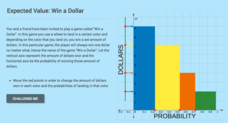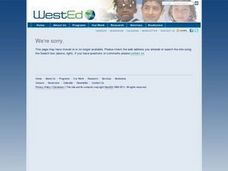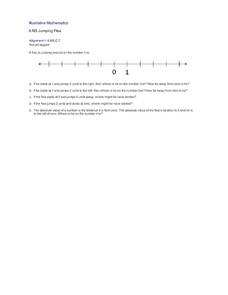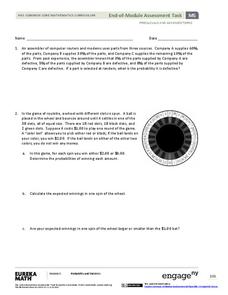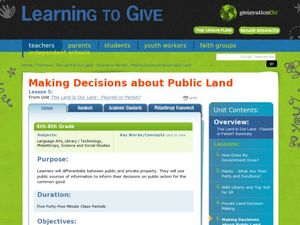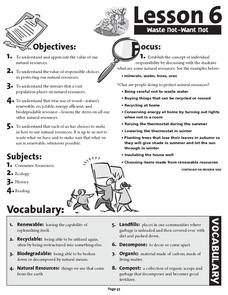Curated OER
The Case of Vanishing Farmland
High schoolers consider decisions about how to use resources that are in short supply. Students role-play different perspectives in a land-use simulation, and examine land use issues around the world. This interesting instructional...
CK-12 Foundation
Expected Value: Win a Dollar
Spin a wheel, land on a color ... and win. Learners create a graph to display the probabilities of the amount of money they can win by spinning a colored wheel. The pupils use the dollar amounts and their probabilities to calculate the...
Curated OER
Conflict Over Land Use 217
Students examine the land use values of a variety of people in Kenya. They determine how these differences can cause conflict among those who use the same land area. They look at the conflict from different points of view and they...
Curated OER
LAND USE DEBATE / TOWN MEETING
Ninth graders research, analyze, and orally defend an issue related to the use of geologic resources. They defend their position in written form by composing a letter to an appropriate source.
Curated OER
Place Value Pretest
Here is a using place value with large numbers activity in which learners interactively answer 10 multiple choice questions, then click to check their answers.
Illustrative Mathematics
Comparing Numbers
Young mathematicians spin their way to a deeper number sense with this fun, collaborative activity. Using two spinners, one with the numbers 0-9 and the other with the decades 00-90, pairs of learners take turns building and comparing...
KOG Ranger Program
The Value of Oregon’s Forests
No matter where you go, you're in the middle of a forest in some way. Use a instructional activity about forests and the many ways they contribute to our world, including the ecosystems of animals and plants living in their shady soil.
Curated OER
Harvesting the New World: Changing Land Uses and Contact Between Cultures in Colonial Times
Ninth graders differentiate the Native American and European values. In this world history lesson, 9th graders define colonialism in their own words. They study the effects of epidemics and other diseases to Native American populations.
Illustrative Mathematics
Jumping Flea
Mathematics minors consider the magnitude of a jumping flea as he hops from place to place. Through this exercise, they will investigate absolute values, as well as positive and negative rational numbers on a number line. The first page...
EngageNY
End-of-Module Assessment Task - Precalculus (Module 5)
Give your young scholars a chance to show what they've learned from the module. The last installment of a 21-part series is an end-of-module assessment task. It covers basic and conditional probabilities, expected value, and analyzing...
101 Questions
The Island Green
The task will fit your needs to a tee. Given pictures and dimensions of a golf green, future golfers determine the distance it would take for a golf ball to land on the green. Of course, we want some mathematical connections, so they...
Curated OER
What's My Nutrition Value?
Second graders, in groups, explore how to read labels on food packages. They learn the nutritional value of food.
Curated OER
Spinning Your Wheels
Students read various articles related to transportation and land use. They cite textual references as they engage in panel discussions, shared inquiry discussions and debates. They write a persuasive essay on the topic.
Curated OER
This Land Is Your Land
Students explore the many faces of America through the video, "This Land Is Your Land." They discuss places they may have visited and record their responses. Students create symbols that respresent the riches of America.
Curated OER
Making Decisions About Public Land
Students write a proposal. For this public land lesson, students discuss the difference between private and public property and brainstorm what problems might occur if a citizen changed public property. Students work in groups to write a...
Chicago Botanic Garden
Introducing Ecosystem Services
Purifying air and water, providing soil in which to grow crops, and moving water through its natural cycle are all services an ecosystem provides that benefit humans. Lesson four in a series lets learners explore and discuss the value of...
Chicago Botanic Garden
Introducing Ecosystem Services
Ecosystems provide many things humans not only use but also need in order to survive. The last instructional activity in the series of seven introduces scholars to the idea of ecosystem services, that ecosystems provide humans with many...
Forest Foundation
Waste Not - Want Not
Recycling is the focus in the sixth of a nine-activity series devoted to forest ecosystems. Class members read an article about the responsible use of natural resources and ways to reduce land fill.
Curated OER
Debating for Land
Students research pertinent information based on historical facts and is supported by quotations from primary sources in order to prepare for a class debate about land ownership in the 19th century.
Curated OER
Public lands: Preserve or develop?
Young scholars compare and contrast the characteristics of various public lands in Canada, including national forests, wilderness areas, national and provincial parks, wildlife sanctuaries, recreation areas and national historic sites....
Core Knowledge Foundation
Christopher Columbus
Take some time to focus on Christopher Columbus, his three ships, the purpose of his voyage, and the new land he discovered. Pay special attention to the included additional materials, they are the real value in this resource.
Curated OER
Pocket Change
Students practice identifying coins and their values. In this money identification lesson, students play a game, where they toll a coin, determine the value, and compare totals to win.
National Museum of the American Indian
The Kwakwaka'Wakw: A Study of a North Pacific Coast People and the Potlatch
Discover the cultural practices and unique value systems of a group of native peoples from Canada called the Kwakwaka'wakw. Your young historians will discuss how conceptions of wealth can vary and how these native people utilized...
Middle Tennessee State University
Who's Afraid of the Big Bad Wolf? A Comparison in American Culture
As part of their study of the Progressive Era, class groups examine a 20th century version of "The Three Little Pigs" through a New Era lens and identify how ideals such as the value of hard work, creativity, and problem solving, etc.,...



